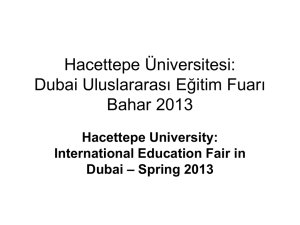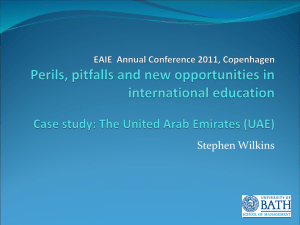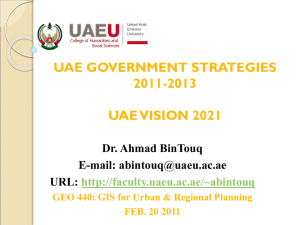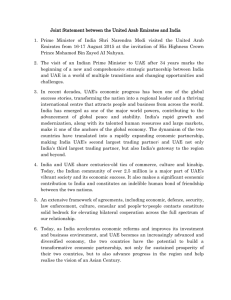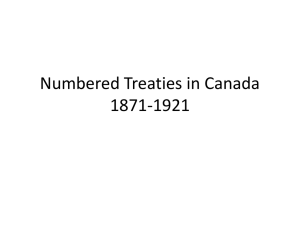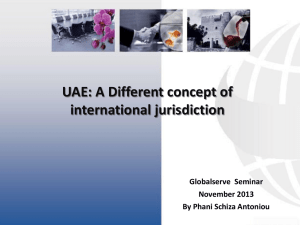Corporate Social Responsibility and Taxation
advertisement
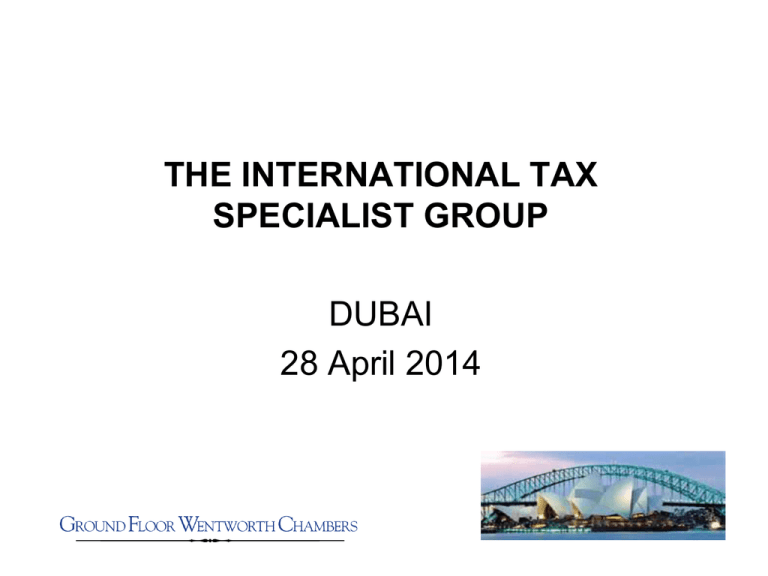
THE INTERNATIONAL TAX SPECIALIST GROUP DUBAI 28 April 2014 TAX RELIEF IN A HOT CLIMATE: THE U.A.E. TAX TREATY NETWORK David Russell QC The UAE tax background • No federal tax • Income tax in 5 of 7 Emirates • In practice restricted to banks and oil companies • No personal taxation UAE objectives in DTAs • • • • • • Stimulation of foreign direct investment Encourage business ventures Enhancement of co-operation Encouragement of tourism Encouragement of bilateral trade Part of wider engagement in international arrangements to combat money laundering, terrorist financing and improve capital market regulation Drivers in DTA negotiations: UAE • UAE federal structure • Protection of returns of outbound FDI – Dividends – Interest – Royalties – Capital Gains • Sovereign Funds How UAE able to achieve its DTA Network? • Has avoided features now defined as harmful tax competition • No “ring fencing” or externally directed tax design features • Lead Partner in OECD/MENA Dialogues, including Tax Treaty partnership • Longstanding commitment to transparency and proper corporate governance, especially DFSA Drivers in DTA negotiations: OECD • • • • “Harmful tax competition” Limitation of Benefits Exchange of Information Mutual assistance Outcomes • 1992 OECD Model Convention provides basic template • Petroleum taxes outside most treaties • Sovereign funds and private investors better protected than under many DTAs • Articles 7, 8, 14 to 21 resolve most trading issues • Significant areas of uncertainty. The Treaties • No comprehensive local list readily available until recently, and even then some uncertainties • IBFD details out of date and no English translations of some treaties • Ratification details with IBFD also out of date • Officially said to be 50, but this includes some which may not be in force Application • Basic Rule is Article 2 of OECD Model Convention • Doesn’t apply to Malaysia, New Zealand, Pakistan Residence • “Liable to tax” formula causes some debate – Indian experience • Formula used in Belarus, Belgium, China, Czech Republic, Indonesia, Italy, Pakistan, Poland, Thailand, Tunisia, Turkey DTAs • Other formulae also confusing: “resident for the purposes of its taxation law” • Very restrictive definition in some treaties, e.g. Canada, Netherlands – and note special exclusion for Netherlands Dividends, Interest, Royalties • Treaties fall into 3 categories: – Residence based taxation – Participation exemption (dividends) – Low withholding rates • GOC exemptions – Note participation levels Articles 10,11 and 12 Problems • Debt Instruments – Does “Interest” cover Islamic finance models? • “Beneficially entitled” – what about a waqf Capital Gains • Gains on immovables, and movables associated with a PE or fixed base, generally taxable according to source. • Other gains (including on shares in companies holding such assets) generally taxable in country of residence • Note exception for shares in land rich companies in Belarus, Canada, China, India, Mozambique, Philippines and Spain • Special rules for France, Korea and Turkey Residual Income • Most treaties follow OECD model in allocating this to country of residence. • Note the exceptions: New Zealand, Pakistan, Seychelles, Singapore, Thailand tax locally sourced income • Article 22 equivalents do, however, protect third country income from tax Limitation of Benefits • US very keen on concept • First country to accede to its views was Australia in 1982 • Most UAE treaties don’t contain such a provision • Note the exceptions: Canada, Germany, India, Korea. • Special provision for Luxembourg Exchange of Information • Most treaties follow 1992 OECD Model Convention • In practice this means UAE won’t be providing much information – see e.g. Article 26 of China DTA • Note exceptions: Netherlands, New Zealand, Spain • Special form of Pakistan DTA article Suggested UAE objectives • Include local taxes • Define “resident” more clearly, and use general residence criteria • Address problem of free zone companies • Avoid restrictions based on “special regimes” • Use residence basis of tax for dividends, interest and royalties • Avoid land rich capital gains provisions • Avoid Limitation of Benefits provisions • Avoid new Exchange of Information rules Opportunities • MENA Region – lack of Limitation of Benefits provision in all MENA DTAs makes UAE a highly attractive RHQ location from a tax perspective • Of MENA high tax countries, only Iraq and Jordan not covered by a DTA with UAE Opportunities (cont.) • Europe – Austrian treaty • No tax on dividends unless shareholding connected with an Austrian PE, interest or royalties • No Limitation of Benefits provision (although Austria would regard a “brass plate” UAE company as abusive) • Relative freedom of operation of Austrian company through Europe THE END

